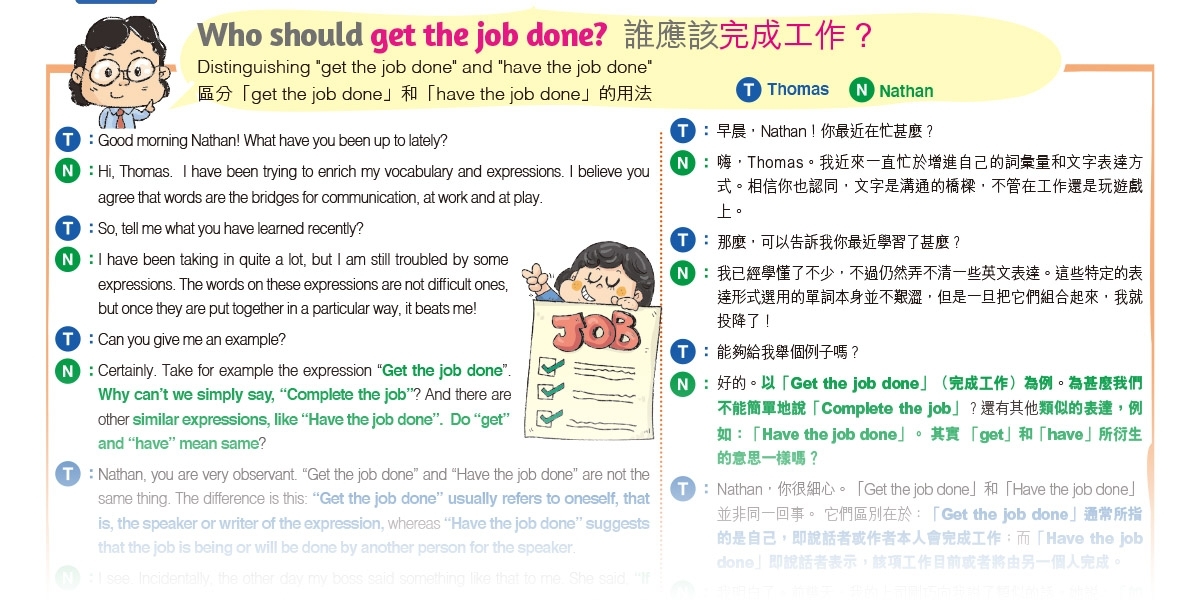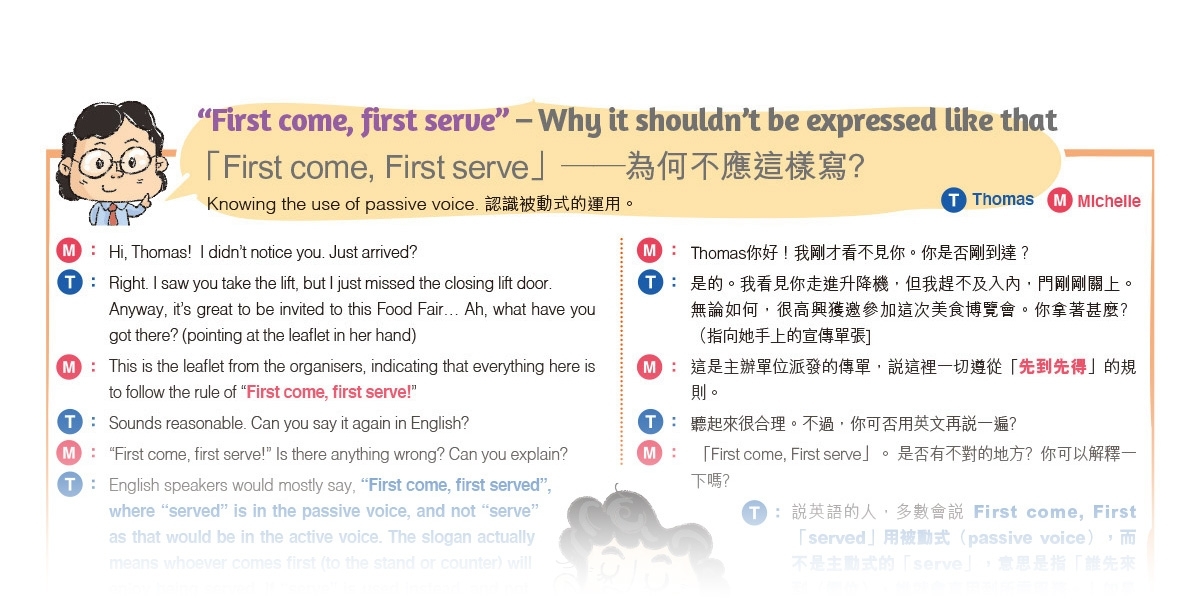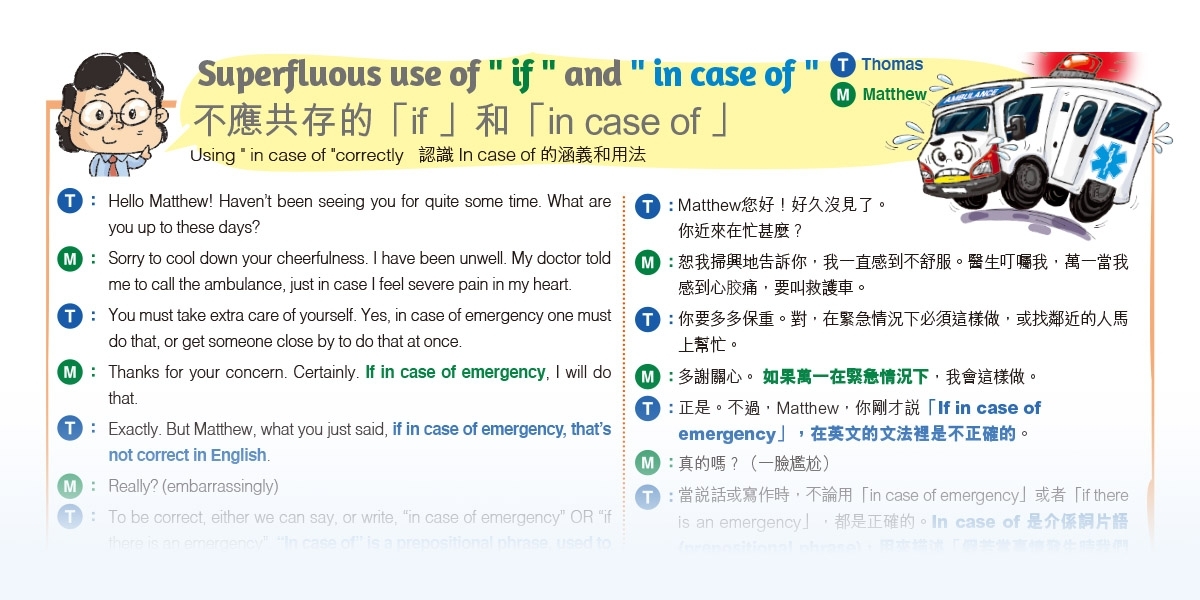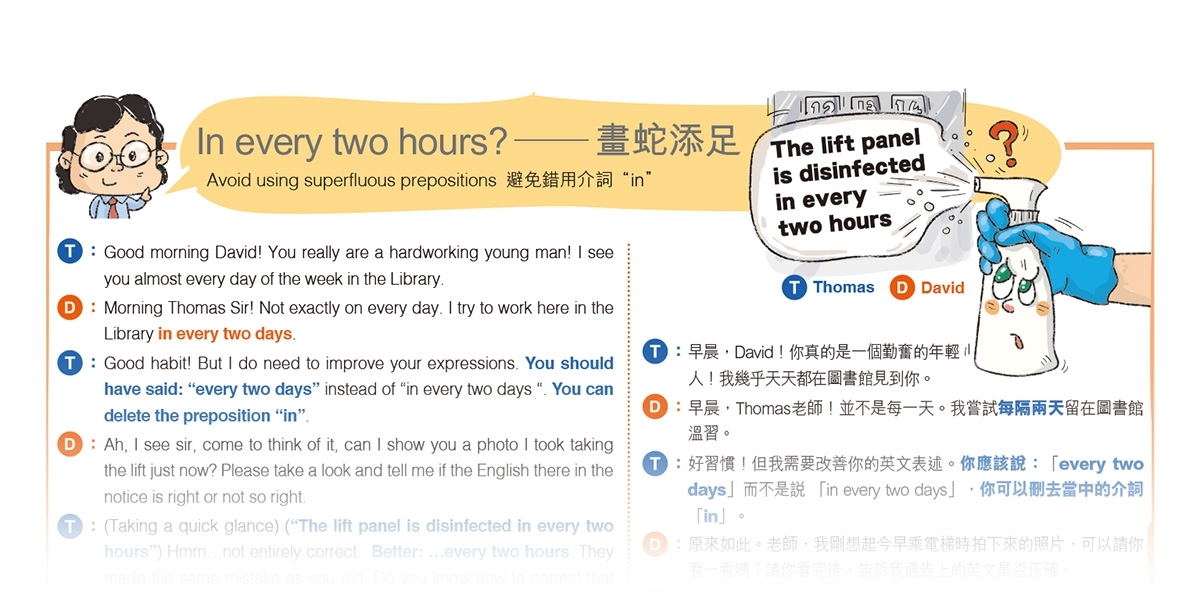昔日文章


Learning English with Thomas
2023.01.06
Who should get the job done? 誰應該完成工作?
Distinguishing "get the job done" and "have the job done" 區分「get the job done」和「have the job done」的用法
T : Thomas, N : Nathan
T: Good morning Nathan! What have you been up to lately?
N: Hi, Thomas. I have been trying to enrich my vocabulary and expressions. I believe you agree that words are the bridges for communication, at work and at play.
T: So, tell me what you have learned recently?
N: I have been taking in quite a lot, but I am still troubled by some expressions. The words on these expressions are not difficult ones, but once they are put together in a particular way, it beats me!
T: Can you give me an example?
N: Certainly. Take for example the expression “Get the job done”. Why can’t we simply say, “Complete the job”? And there are other similar expressions, like “Have the job done”. Do “get” and “have” mean same?
T: Nathan, you are very observant. “Get the job done” and “Have the job done” are not the same thing. The difference is this: “Get the job done” usually refers to oneself, that is, the speaker or writer of the expression, whereas “Have the job done” suggests that the job is being or will be done by another person for the speaker.
N: I see. Incidentally, the other day my boss said something like that to me. She said, “If you’re too busy to get the documents copied right away, have it done by Sandy.”
T: You’ve got it all, Nathan! Great!
T: 早晨,Nathan!你最近在忙甚麼?
N: 嗨,Thomas。我近來一直忙於增進自己的詞彙量和文字表達方式。相信你也認同,文字是溝通的橋樑,不管在工作還是玩遊戲上。
T: 那麼,可以告訴我你最近學習了甚麼?
N: 我已經學懂了不少,不過仍然弄不清一些英文表達。這些特定的表達形式選用的單詞本身並不艱澀,但是一旦把它們組合起來,我就投降了!
能夠給我舉個例子嗎?
好的。以「Get the job done」(完成工作)為例。為甚麼我們不能簡單地說「Complete the job」?還有其他類似的表達,例如:「Have the job done」。 其實 「get」和「have」所衍生的意思一樣嗎?
T: Nathan,你很細心。「Get the job done」和「Have the job done」並非同一回事。 它們區別在於:「Get the job done」通常所指的是自己,即說話者或作者本人會完成工作;而「Have the job done」即說話者表示,該項工作目前或者將由另一個人完成。
N: 我明白了。前幾天,我的上司剛巧向我說了類似的話。她說:「如果你忙得不能立即複印這份文件,那麼找Sandy代勞。」
T: Nathan你真的學懂了!非常好!


Learning English with Thomas
2022.12.18
“First come, first serve” – Why it shouldn’t be expressed like that
「First come, First serve」——為何不應這樣寫﹖
Knowing the use of passive voice. 認識被動式的運用。
T : Thomas M : Michelle
M : Hi, Thomas! I didn’t notice you. Just arrived?
T : Right. I saw you take the lift, but I just missed the closing lift door.
Anyway, it’s great to be invited to this Food Fair… Ah, what have you got there? (pointing at the leaflet in her hand)
M : This is the leaflet from the organisers, indicating that everything here is to follow the rule of “First come, first serve!”
T : Sounds reasonable. Can you say it again in English?
M : “First come, first serve!” Is there anything wrong? Can you explain?
T : English speakers would mostly say, “First come, first served”, where “served” is in the passive voice, and not “serve” as that would be in the active voice. The slogan actually means whoever comes first (to the stand or counter) will enjoy being served. If “serve” is used instead, and not “served”, then the meaning is quite different and would mean whoever comes first will need to serve. That is quite the opposite, turning the customer into a service provider!
M : Such a big difference! I can see it now.
M : Thomas你好!我剛才看不見你。你是否剛到達?
T : 是的。我看見你走進升降機,但我趕不及入內,門剛剛關上。無論如何,很高興獲邀參加這次美食博覽會。你拿著甚麼﹖ (指向她手上的宣傳單張]
M : 這是主辦單位派發的傳單,說這裡一切遵從「先到先得」的規則。
T : 聽起來很合理。不過,你可否用英文再說一遍﹖
M :「First come, First serve」。 是否有不對的地方﹖你可以解釋一下嗎﹖
T : 說英語的人,多數會說 First come, First 「served」用被動式(passive voice),而不是主動式的「serve」,意思是指「誰先來到(攤位),誰就會享用到所需服務。」如果用「serve」, 語意上大有不同,變了 「 當誰先來到(攤位),誰就要提供服務。」兩者的意思幾乎相反——原本光顧的客人變成了服務提供者。
M : 分別原來這麼大!我現在明白了。


Learning English with Thomas
2022.12.11
Superfluous use of " if " and " in case of "
不應共存的「if 」和「in case of 」
Using " in case of "correctly 認識 In case of 的涵義和用法
T:Thomas M:Matthew
T: Hello Matthew! Haven’t been seeing you for quite some time. What are you up to these days?
M: Sorry to cool down your cheerfulness. I have been unwell. My doctor told me to call the ambulance, just in case I feel severe pain in my heart.
T: You must take extra care of yourself. Yes, in case of emergency one must do that, or get someone close by to do that at once.
M: Thanks for your concern. Certainly. If in case of emergency, I will do that.
T: Exactly. But Matthew, what you just said, if in case of emergency, that’s not correct in English.
M: Really? (embarrassingly)
T: To be correct, either we can say, or write, “in case of emergency” OR “if there is an emergency”. “In case of” is a prepositional phrase, used to describe what should be done if something happens. So, adding an “if” to “in case of” is superfluous, and sounds wrong. Do you agree?
M: Yes. You’re right. We do need to be careful about even minor things in English. Sorry, I’ve got to go now.
T: Take good care of yourself and get well soon!
T: Matthew您好!好久沒見了。你近來在忙甚麼?
M: 恕我掃興地告訴你,我一直感到不舒服。醫生叮囑我,萬一當我感到心胶痛,要叫救護車。
T: 你要多多保重。對,在緊急情況下必須這樣做,或找鄰近的人馬上幫忙。
M: 多謝關心。 如果萬一在緊急情況下,我會這樣做。
T: 正是。不過,Matthew,你剛才說「If in case of emergency」,在英文的文法裡是不正確的。
M: 真的嗎?(一臉尷尬)
T: 當說話或寫作時,不論用「in case of emergency」或者「if there is an emergency」,都是正確的。In case of 是介係詞片語 (prepositional phrase),用來描述「假若當事情發生時我們該做些甚麼」。所以,在in case of 前再加上具有「如果、假若」意思的 「if」,則有點多餘及意思重疊。你同意嗎?
M: 是的,你說得對。在英語運用上,即使細微事情也需要小心。不好意思,我現在要走了。
T: 保重身體,祝你早日康復!


Learning English with Thomas
2022.12.04
In every two hours? —— 畫蛇添足
Avoid using superfluous prepositions 避免錯用介詞“in”
T : Thomas D : David
T : Good morning David! You really are a hardworking young man! I see you almost every day of the week in the Library.
D : Morning Thomas Sir! Not exactly on every day. I try to work here in the Library in every two days.
T : Good habit! But I do need to improve your expressions. You should have said: “every two days” instead of “in every two days “. You can delete the preposition “in”.
D : Ah, I see sir, come to think of it, can I show you a photo I took taking the lift just now? Please take a look and tell me if the English there in the notice is right or not so right.
T : (Taking a quick glance) (“The lift panel is disinfected in every two hours”) Hmm…not entirely correct. Better: …every two hours. They made the same mistake as you did. Do you know how to correct that now?
D : Now I can, sir. It should be: “The lift panel is disinfected every two hours.” Is that right?
T : Haha! You certainly got it – learning fast and applying at once. (Teacher raising his thumb smilingly)
T : 早晨,David!你真的是一勤奮的年輕人!我幾乎天天都在圖書館見到你。
D : 早晨,Thomas老師!並不是每一天。我嘗試每隔兩天留在圖書館溫習。
T : 好習慣!但我需要改善你的英文表述。你應該說:「every two days」而不是說 「in every two days」,你可以刪去當中的介詞 「in」。
D : 原來如此。老師,我剛想起今早乘電梯時拍下來的照片,可以請你看一看嗎?請你看完後,告訴我通告上的英文是否正確。
T : (瞥了一眼)(「The lift panel is disinfected in every two hours」)嗯……這樣寫不完全正確,寫成「every two hours」較佳。 他們跟你一樣犯了相同的錯誤。你現在懂得如何修改嗎﹖
D : 老師,現在我懂了。這應該改為:「The lift panel is disinfected every two hours」,對嗎?
T : 哈哈,你果然是學以致用。(老師欣慰地豎起大姆指)


